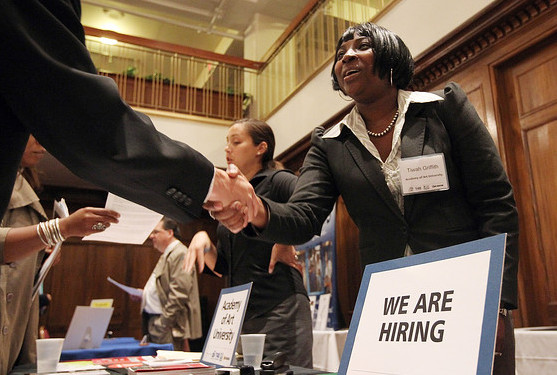US economy grows quickly despite pessimism
- By Mitchell Blatt
 0 Comment(s)
0 Comment(s) Print
Print E-mail China.org.cn, May 3, 2015
E-mail China.org.cn, May 3, 2015
|
|
|
The latest U.S. jobs report shows that employers added 126,000 workers in March. |
The latest U.S. jobs report showing the addition of 126,000 new jobs got the usual cold shoulder from conservatives and Republicans.
"Yes, we've created 11 million jobs, but that number should be closer to 18 million," Stephen Moore, a conservative economist, wrote in National Review.
Under Republican Ronald Reagan's presidency from 1981 to 1989, the economy created many more jobs, conservatives argue. However, they are wrong in trying to compare the current economy with that of 30 years ago when circumstances were different.
The world economy was growing much faster in the 1980's, and, although there was a recession in 1981, there was nothing like the economic crisis of 2008 that caused world GDP to drop by 2% in the following year (it only dropped by 0.4% in 1982).
A better comparison would be to compare the United States to its peers, namely the other developed countries, like those in the European Union. If you do that, you get a much different picture.
American economic growth since 2008 has kept up with the world level and surpassed the EU by wide margins. In 2009, the EU saw shrinkage of 4.4%, while the U.S. lost 2.8% of its GDP. Since then, the U.S. economy has been growing, while the EU saw negative growth (-0.5%) in 2012 and zero growth in 2013. Finally, the EU grew by a modest 1.3% in 2014. In all of those years, American GDP grew by over 2%.
It's the same with employment. The unemployment rate in America is almost down to the same level as it was when Obama took office -5.0%. It hit its peak in October 2009 at 10%, but was down to 5.5% by January 2015. Meanwhile, the EU unemployment rate kept rising until 2013 before it began to improve, and now it is at 9.8%, three percentage points higher than it was in January 2008.
It is true, as Republican Senator Lindsey Graham and others point out, that the labor force participation rate has declined since the recession, meaning less people are looking for jobs. According to the Bureau of Labor Statistics, however, the decline is largely due to the aging of baby boomers and more young people now attending college.
In fact the decline began long before Obama took office - namely 1999. A report issued by the Chicago office of the Federal Reserve concluded that, "half of the post-1999 decline …can be explained by long-running demographic patterns, such as the retirement of baby boomers."
Indeed, America, like many countries, has an aging population. The labor participation rate of those between the ages of 55 and 70 actually increased substantially from 2000 to 2011. Their share of the population grew from 17.2% to 22.2% in that period so that as they retire there'll be a lack of workers and more spending on entitlement programs, which will slow the economy.
Much as politicians try to use economic performance as an evaluator of specific policies and politicians in command, much of the economy is ultimately defined by long-term trends and things out of politicians' control.
They can't control the demographics very easily. Even if they could implement a population control policy, such as that in China, the results wouldn't show for years. And, even in China, the policy is currently being loosened to increase the labor force in the future. Nor do politicians control the activities of individual private firms or the spending habits of consumers.
But politicians exist to advance their careers-to get elected or promoted-so, of course, they will use the economy to either seek praise or attack their opponents. In this case, the Republicans can point to some things that look bad on the surface. Obviously the economy isn't growing very quickly when the whole world economy is growing slowly.
Inward looking Americans will only compare this time to the past, not to the rest of the world. By the same token, Obama would like to take credit for the good economy, but to what degree his policies are responsible is hard to assess.
Another political tactic is to deny the figures themselves. Unemployment rates and inflation rates are made up, so it's said. Sometimes the accuracy of the chart isn't as real to people as the perception they have that their grocery store bills are getting bigger though their shopping habits haven't changed, as conservative CNN contributor Erick Erickson observed about inflation.
Perceptions, however, can be very tricky. New York Times contributor Josh Barro cites the example of the "Cleveland Federal Reserve Bank surveyed over 20,000 people between 1998 and 2001 and found that, on average, Americans thought inflation was around 6.0%; during that period, actual CPI inflation averaged 2.7%."
The U.S. economy is doing well, but Americans have unrealistic expectations and wrong perceptions about it.
The author is a columnist with China.org.cn. For more information please visit: http://www.china.org.cn/opinion/MitchellBlatt.htm
Opinion articles reflect the views of their authors, not necessarily those of China.org.cn.







Go to Forum >>0 Comment(s)